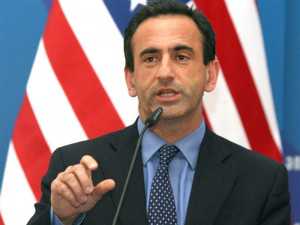By Haroon Siddiqui
Editorial Page
Note: This article has been edited from a previous version.
Turkey has not given up its dream of joining the European Union. It
has not become “anti-West.” It does not have any intention of cutting
its longstanding relationship with Israel.
That’s what Turkish Prime Minister Recep Tayyip Erdogan told the Star
in an interview yesterday.
But he added that relations with Israel will remain strained until
Israel fulfills four conditions:
*apologizes for the May 31 commando raid on the Turkish ship that was part of the flotilla taking humanitarian aid to Gaza;
*pays compensation to the families of the nine people killed, eight
Turks and one Turkish-American;
*agrees to an international probe, as called for by UN
Secretary-General Ban Ki-moon into the incident (as opposed to an
Israeli inquiry); and
*lifts its embargo on the Gaza Strip.
Reminded that Israel has already announced an easing of the embargo,
Erdogan said:
“We’ve heard those statements but no steps have been taken. Similar
statements have been made in the past.”
He also suggested that Turkey is planning to sue Israel on behalf of
the victims.
Erdogan, in Toronto for the G20 summit, was to raise the issue with
Barack Obama at a bilateral meeting last night. He was to augment his
arguments with forensic pictures of and reports on the dead that he is
carrying with him.
Turkey, a member of NATO, has long been Israel’s best Muslim ally. But
relations have been strained since the 2008-09 Gaza war, which Erdogan
condemned and reportedly called Israel “the principal threat to peace
in the Middle East.”
There was Turkey’s initiative with Brazil for a compromise over the
Iranian nuclear issue, which was rejected by Washington. Turkey voted
against the U.S,-led resolution in the U.N. Security Council on fresh
sanctions on Iran.
And following the May 31 incident, Erdogan said that Israel had made
“a historic mistake,” that “Israel risks losing its most important
friend in the region if it does not change its mentality,” and that
“peace and stability will not come to the region as long as the
blockade of Gaza persists.”
In the interview yesterday, Erdogan said the Gaza aid flotilla was
organized by non-governmental organizations, was carrying volunteers
from 33 nations, along with humanitarian aid – food, medicine, toys,
construction material, etc.
It was attacked “in international waters, 72 miles (….) out of the
territorial waters of Israel. Unfortunately, guns and rifles and
plastic bullets were used.”
He said he is familiar with the argument that Israel has a right to
defend itself. “Of course, you can protect your borders against armed
people or against a military enemy, and you can consider such action
in your own national borders.
“But you have no right to do that in international waters …
“I interpret this as state terror.”
He said some of the dead had been shot “at close range,” “at point
blank range,” “from the chest up,” “from behind the neck.”
If the intent was not to kill, the plastic bullets could have been
fired at below the knee level, he said.
When the boats were towed to an Israeli port and the passengers held
in custody, Erdogan said he called Obama, “and thanks to very intense
efforts by the Americans, the people who had been held in prison were
delivered to us within 24 hours.
“So I am very grateful to President Obama for his intervention. If it
hadn’t been for this very speedy response on the part of President
Obama, things could have been more problematic.”
Erdogan cited United Nations and other reports that Gaza is a
humanitarian disaster, and added that the aid promised at a donors’
conference is yet to be delivered. Destroyed infrastructure remains in
ruins.
Is Turkey becoming anti-Israeli?
Not so.
“I want to be very clear. In the Middle East, Turkey is the only
friendly country to Israel, so much so that during the (Ehud) Olmert
government, Turkey helped Israel hold indirect talks with Syria.
“We held five rounds, the last one was in my official residence–for
six hours, with Olmert present. We had gotten down to writing words
for some sort of an agreement … That meeting was on a Monday. And we
had decided that we will come back on Friday to complete the work.”
That Friday meeting never took place, and on Saturday the “Israeli
bombing of Gaza began.”
As that Friday was approaching, the Israelis “weren’t answering our
calls–must have been in preparation of the Gaza bombing. Earlier,
whenever we had called, they’d always call back but this time they
didn’t.”
As Turkey pursues closer relations and increased trade with its
neighbours, and is emerging as a strong regional player in the Middle
East, is it turning away from the West?
“That would be a very wrong conclusion. Turkey is developing contacts
all over the world. But Turkey has not cut off relations with anyone.
Such a thing is not on the agenda.”
How about the European Union – has Turkey given up on it? U.S. Defence
Secretary Robert Gates recently blamed Europe for having “pushed and
pushed” Turkey away. Italian Foreign Minister Franco Frattini agreed, saying, “We Europeans have made a mistake in pushing Turkey eastwards instead of bringing it towards us.”
But Erdogan said Turkey still very much wants to join the EU.
“We continue with determination to walk on the European path, despite
the efforts on the part of the European Union to prevent the opening
of some of the chapters that are part of the negotiations process.”
hsiddiqui@thestar.ca, Jun 27 2010




